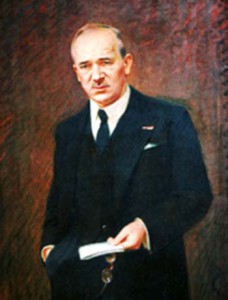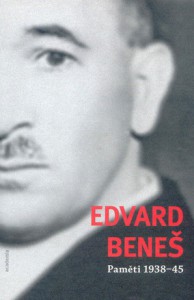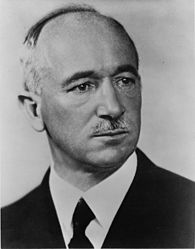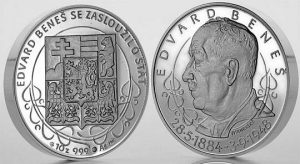Edvard Beneš – Czechoslovak Statesman
By Tracy A. Burns
From childhood to teaching
 The youngest son of 10 children, Eduard (he would change the spelling of his first name when he was attending university) was born May 28, 1884, in Kožlany, Bohemia, about 60 kilometers from Prague. His brother Vojta also took up politics. The future statesman spent his childhood years in Prague’s Vinohrady district. After graduating from the Philosophical Faculty of Charles University, he went abroad with a two-year tenure in Paris and another year in Berlin. In Paris, Beneš studied at the Sorbonne and the Independent School of Political and Social Studies. He earned his doctorate in Dijon, France, where he focused on the political struggles of Slavonic nations in Austria. Back in Prague, Beneš received another doctorate. After completing his studies, he taught at a business school and at a university.
The youngest son of 10 children, Eduard (he would change the spelling of his first name when he was attending university) was born May 28, 1884, in Kožlany, Bohemia, about 60 kilometers from Prague. His brother Vojta also took up politics. The future statesman spent his childhood years in Prague’s Vinohrady district. After graduating from the Philosophical Faculty of Charles University, he went abroad with a two-year tenure in Paris and another year in Berlin. In Paris, Beneš studied at the Sorbonne and the Independent School of Political and Social Studies. He earned his doctorate in Dijon, France, where he focused on the political struggles of Slavonic nations in Austria. Back in Prague, Beneš received another doctorate. After completing his studies, he taught at a business school and at a university.
Beneš and the struggle for Czechoslovak independence
Convinced that Czechs and Slovaks shared the same ethnic identity, Beneš was very active in the struggle for Czechoslovak independence during World War I. He coordinated the anti-Austrian resistance group Maffia and set up a home base in Paris in September of 1915, where along with future president Tomáš G. Masaryk and one of the major players in the resistance government, Slovak Milan Rastislav Štefánik, he tried to gain support for an independent Czechoslovakia. The Czech resistance leader was also responsible for coordinating legions that fought for the West in France, Russia, and Italy.
Beneš as Minister of Foreign Affairs
When Czechoslovakia was born in 1918, Beneš became Minister of Foreign Affairs. The experienced diplomat served as Prime Minister from 1921 to 22, when he built up a defensive system against Austro-Hungary, called the Little Entente, with Romania and Yugoslavia, and he also paved the way for the Czechoslovak French Treaty of 1924. A representative in Parliament from 1919-26 and 1929-35, Beneš was a member of the Czechoslovak Socialist Party, as of 1926 the Czechoslovak National Socialist Party, which was not affiliated with the Nazi German National Socialist Workers’ Party. Established in 1898, the Czechoslovak Socialist Party aspired to gain independence from Austro-Hungary and asserted that democracy and morality were conditions of socialism. In 1935 the treaty he signed with the Soviet Union stated that the USSR would aid Czechoslovakia in wartime if France also came to the country’s assistance.
Slovak unrest
The second half of the 1930s was a period fraught with complaints from the German and Slovak minorities who demanded more rights and freedom. For example, in May of 1935 the fascist and nationalistic Hlinka’s Slovak People’s Party tried to pressure the dedicated diplomat to make Slovak the official language of Slovakia and to provide them with a legislative diet in Bratislava, among other demands. Beneš stood firm, asserting that only a united Czechoslovak nation could survive the threats caused by the Nazi and fascist regimes in neighboring countries.
Czechoslovak President Edvard Beneš
Beneš succeeded Masaryk as president in December of 1935. The Sudeten Germans – ethnic Germans living in the Czech lands – and Slovaks continued to assert more and more pressure. In 1938 Beneš recognized Slovakia as an independent nation. During April of that same year, the Sudeten German question came to a head when the German minority issued the Carlsbad demands, which included rights such as full equality with the Czechs, complete self-government, and freedom to express Nazi ideology. At first, Beneš stood his ground, but he finally did agree to the demands that September. Beneš also engineered a „Third Plan,“ which involved setting up 20 or more small districts where Germans would have much autonomy if they proved to be the majority in those areas. Surrendering to the demands of the Germans and Slovaks triggered much disapproval in the government. Convinced the Munich Agreement that ceded the Sudetenland to the Third Reich was unjust, Beneš resigned on October 5, 1938.
Resistance activities during the Nazi Occupation
 In 1938 he found himself abroad once more. When Britain and France joined the war against Germany in October of 1939, he established a government-in-exile in London, and Britain acknowledged it during 1940. The Soviet Union followed in 1941. Beneš and Czechoslovak military intelligence officer and resistance leader František Moravec contributed to the plan formed in England by the Czechoslovak army-in-exile that aspired to assassinate high-ranking Nazi official Reinhard Heydrich with Operation Anthropoid. The successful plan brought about brutal reprisals, though. More than 13,000 people were arrested, and about 5,000 were killed in reprisals. The villages of Lidice and Ležáky were razed. In Lidice 199 men were murdered, 95 children (most of whom would be gassed) were taken away from their parents, eight children were given to German families and 195 women were sent to a concentration camp. All the men in Ležáky were executed.
In 1938 he found himself abroad once more. When Britain and France joined the war against Germany in October of 1939, he established a government-in-exile in London, and Britain acknowledged it during 1940. The Soviet Union followed in 1941. Beneš and Czechoslovak military intelligence officer and resistance leader František Moravec contributed to the plan formed in England by the Czechoslovak army-in-exile that aspired to assassinate high-ranking Nazi official Reinhard Heydrich with Operation Anthropoid. The successful plan brought about brutal reprisals, though. More than 13,000 people were arrested, and about 5,000 were killed in reprisals. The villages of Lidice and Ležáky were razed. In Lidice 199 men were murdered, 95 children (most of whom would be gassed) were taken away from their parents, eight children were given to German families and 195 women were sent to a concentration camp. All the men in Ležáky were executed.
Leanings toward Russia
During the first three years of the war, Beneš sought to set up a federation between the Czechoslovaks and Poles, but due to pressure from Moscow, it did not become a reality. He did, though, sign treaties with Great Britain and France. The Czechoslovak statesman with leanings toward Russia went to Moscow to meet with Stalin and signed a new treaty with the USSR in 1943, feeling assured that the West would become more socialist after the war and the USSR would have a more western orientation.
Beneš’s second term as president and the Beneš decrees
Beneš returned to Czechoslovakia in 1945 and was elected President of the second republic in June of 1946. Arguing that the Sudeten Germans were collectively responsible for the destruction of independent Czechoslovakia, he put into effect the Beneš decrees, confiscating the property of Germans, traitors, and collaborators in the country, stripping them of their citizenship, and even expelling them from the nation. The controversial decrees are still in effect.
Communism and February 25, 1948
 Communists became major players in the new government as they controlled the most important ministries. Communist Klement Gottwald became Prime Minister in 1947. On February 20, 1948, the Communists asserted much pressure by forming a people’s militia of 15,000 members. That day the 12 non-communist ministers resigned, convinced that Beneš would establish a new government without the Communist Party. However, Beneš made no attempt to mobilize the fierce opposition against the Communists because he thought the USSR should play a major role in central Europe and was afraid that Germany would become powerful again. Beneš was convinced that Soviet socialism would be moderate and European while he predicted that European capitalism would lean more toward socialism.
Communists became major players in the new government as they controlled the most important ministries. Communist Klement Gottwald became Prime Minister in 1947. On February 20, 1948, the Communists asserted much pressure by forming a people’s militia of 15,000 members. That day the 12 non-communist ministers resigned, convinced that Beneš would establish a new government without the Communist Party. However, Beneš made no attempt to mobilize the fierce opposition against the Communists because he thought the USSR should play a major role in central Europe and was afraid that Germany would become powerful again. Beneš was convinced that Soviet socialism would be moderate and European while he predicted that European capitalism would lean more toward socialism.
It was Benes’ hesitation in February of 1948 that allowed the Communists to take over the government and make Czechoslovakia into a totalitarian state. Surrendering to the Communist threat, he appointed a Communist majority government on February 25, 1948. Refusing to sign the new pro-Communist constitution, Beneš abdicated on June 7 of that year, and Klement Gottwald became the new president.
The death of a prominent statesman
Three months later Beneš died. Stricken by spinal tuberculosis and other illnesses, the prominent Czechoslovak statesman passed away on September 3, 1948, at his villa in Sezimovo Ústí, where he is buried alongside his wife.
Beneš’s writing legacy
Beneš was an avid writer advocating democracy as well as a politician. His memoirs and speeches make up a few of the many books he published. His works printed in English translation are Bohemia’s Case for Independence from 1917, his My War Memoirs from 1928, and Democracy Today and Tomorrow from 1939.
The controversial Edvard Beneš
 Edvard Beneš is a name that triggers much controversy: some people consider him a phenomenal politician dedicated to democracy while others sneer at him, pinpointing the tragedies of his political career. Beneš did make great achievements in his resistance work during both wars and was responsible for some ground-breaking events as foreign minister and president. Along with Masaryk, he put Czech politics on the European and world map. Yet he was trapped in a tragic drama of international relations. He made mistakes. He put too much faith in the USSR and Russian socialism, for example. He hesitated when he should have taken action in February of 1948. Both his achievements and tragedies have to be considered within the historical context of the times as he was not once but twice defeated by ideological parties that destroyed democracy in Czechoslovakia.
Edvard Beneš is a name that triggers much controversy: some people consider him a phenomenal politician dedicated to democracy while others sneer at him, pinpointing the tragedies of his political career. Beneš did make great achievements in his resistance work during both wars and was responsible for some ground-breaking events as foreign minister and president. Along with Masaryk, he put Czech politics on the European and world map. Yet he was trapped in a tragic drama of international relations. He made mistakes. He put too much faith in the USSR and Russian socialism, for example. He hesitated when he should have taken action in February of 1948. Both his achievements and tragedies have to be considered within the historical context of the times as he was not once but twice defeated by ideological parties that destroyed democracy in Czechoslovakia.




